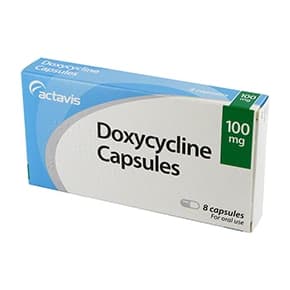- Private & confidential service
- Genuine medication
- All-inclusive service - No hidden fees
- Next day delivery
- STIs
- Ureaplasma Urealyticum
Ureaplasma Urealyticum: start your consultation
- 1. Answer the online medical questions
- This helps our doctors to decide which treatment is safe for you.
- 2. Select your treatment
- You will see a list of recommended treatments. You can select the one you prefer.
- 3. Checkout and delivery
- Once you’ve completed the checkout, our doctors will review your answers. If all is safe, you will receive your treatment tomorrow.

- Second-line treatment for STIs
- Short-term application
- Used to treat chlamydia, NSU and ureaplasma

- Treats various STIs
- Effective for acne and malaria
- Easy-to-take capsules
Ureaplasma Urealyticum
Ureaplasma urealyticum is a common bacteria that usually causes little to no symptoms. If it does, it can result in some discomfort such as pain and discharge in the genital area. It can be treated antibiotics that you can order online at HealthExpress.
Topics
What is Ureaplasma urealyticum?
Ureaplasma urealyticum is a bacterium commonly found in the urinary and genital tract.
Most people only realise they have the infection if they develop another condition that causes it such as non-gonococcal urethritis or a urinary tract infection (UTI).
What's the difference between ureaplasma urealyticum and mycoplasma genitalium?
Ureaplasma urealyticum and Mycoplasma genitalium (M.gen) are two different types of bacteria but belong to the same class known as Mycoplasmas. This means Ureaplasma and Mycoplasma are closely connected and often cause the same infections.
What causes a Ureaplasma infection?
The bacteria usually exists naturally in the body without causing any issues.
When the bacteria overgrows, it disrupts the body’s balance of good and bad bacteria which can lead to infection. This means you can occasionally develop an infection without being sexually active.
It is rarely regarded as a sexually transmitted infection (STI) because of the low risk of it causing disease. This is because the bacteria already exist in the genitourinary tract.
However, sexual activity and sexual contact can spread the bacteria as well as create an imbalance in the flora.
The bacteria can also spread to foetuses or newborn babies from their mothers.
What are the symptoms of Ureaplasma?
Ureaplasma is usually the underlying cause of different infections. It is also asymptomatic in many cases and most infected people may not even realise they have the condition.
If symptoms do appear, these can be very similar symptoms to urethritis, other STIs and infections like bacterial vaginosis, bladder infections or pelvic inflammatory disease (PID).
Men and women will experience the following symptoms.
| Symptoms in men | Symptoms in women |
|---|---|
|
|
These symptoms can appear like many types of genital or urinary infections. So, getting tested if you have any of these symptoms is important.
Symptoms in newborns
Ureaplasma may cause symptoms in newborn babies, with an increased risk in premature babies.
It may result in pneumonia, other lung problems or meningitis. Rarely, it can cause grave complications in foetuses.
Pregnant women should get tested as soon as possible if they have any symptoms of an STI or another vaginal infection.
How can I get tested for ureaplasma?
If you have any unusual symptoms and you have been sexually active, it’s a good idea to get an STI test. Especially if you have multiple sexual partners, as this can increase the risk.
The test will usually involve a urine sample or cervical swab. The cells are difficult to spot under a microscope. So, specific tests known as PCR tests look for the DNA of the bacteria.
You can get tested for free at most sexual health clinics by a healthcare professional. There are also some test kit services you can order online but you will have to do the test yourself and you may have to pay.
What are the risks of ureaplasma?
In most cases, ureaplasma won’t cause any complications.
However, in rare cases, studies have linked the bacteria to fertility problems and complications in babies.
There is also evidence that it is linked to painful bladder syndrome and chronic urinary tract infections. Untreated UTIs can also result in kidney problems like kidney infections.
How can a Ureaplasma infection be prevented?
It’s not always possible to prevent Ureaplasma, as the bacteria live naturally in our immune systems.
However, practising safe sex is one of the most sure ways of preventing the transmission of bacteria.
Make sure you:
- wear barrier contraception (e.g. condoms) during sex
- get regularly tested for STIs - especially if you have multiple sexual partners
- be open about your sexual history with your sexual partner(s)
- avoid sharing unwashed sex toys
These measures will prevent the spreading and catching of Ureaplasma and any other STIs.
How do I treat a Ureaplasma infection?
If you have tested positive for Ureaplasma urealyticum, you will require a course of prescription antibiotics.
The first-line treatment option for Ureaplasma is Doxycycline. If you can’t take Doxycycline, you will be offered the second-line treatment Azithromycin.
You must take the whole course of antibiotics - even if you start to feel better. This will ensure the infection is completely cured and prevent reinfection and antibiotic resistance.
If you are pregnant, you should consult your doctor for alternative options.
Can I buy Ureaplasma treatment online?
You can order Ureaplasma treatment online from HealthExpress. Simply complete an online medical form. This will then be reviewed by one of our UK doctors and, once approved, your prescription will be sent to you with free delivery.
medical form
medication
prescription
from pharmacy

